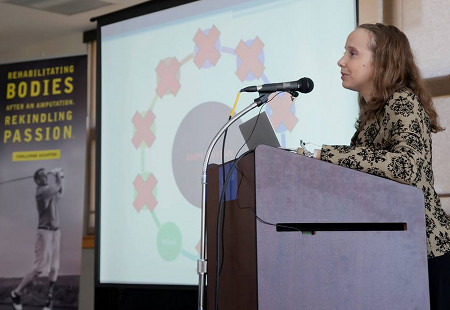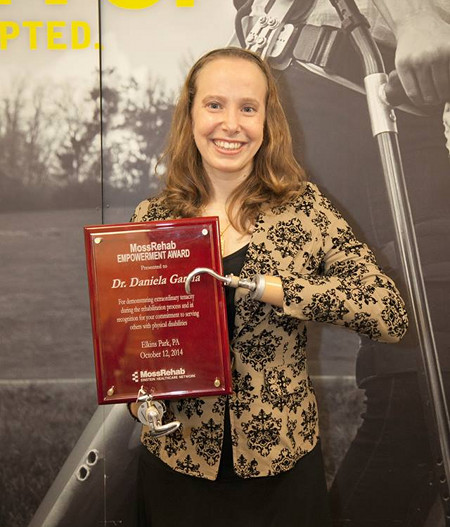
Daniela Palomer Garcia, MD, was in her fourth year of medical school when she fell through a gap onto the tracks during a train ride. The impact of the fall and the train passing over her amputated her left leg above the knee, severed both forearms and hands, and amputated her right leg below the knee. Despite these unimaginable injuries—and the long months of rehabilitation that followed, including three courses of treatment (six weeks, eight weeks and four weeks) at MossRehab —Dr. Garcia recovered, completed medical school, and became the first quadrilateral amputee physician in the world. Today, she is a physiatrist working in The Gait Laboratory at the Teleton Rehabilitation Institute in Chile.
Dr. Garcia, who was a keynote speaker at the two-day MossRehab Rehabilitation of Persons with Amputation conference in October, took time out to answer our questions.
How did your personal experience influence the way you treat your patients and the way you explain their recovery and adjustment process?
Being in the role of a patient gave me an inside look at what my patients go through in their daily lives. Now I not only understand—from a medical perspective—what they are going through, I know what it’s like.
How did your own experience with rehabilitation, adapting to prosthetics and adjusting the way you performed daily activities influence your choice to become a physiatrist?

I’ve always loved to work with children so, before the accident, I wanted to be a pediatrician. I really didn’t know anything about rehabilitation or physiatry. After the accident, I learned and experienced what rehabilitation could do for someone, and I fell in love with it. Also, meeting an extraordinary physiatrist like Dr. Alberto Esquenazi, gave me a role model to follow. Now I work in rehabilitating children and young adults. When you live through a life-changing situation, your perspective changes, and you learn to appreciate what really makes you happy. I realized that, for me, being a doctor was one of those things.
What are some of the biggest professional challenges you’ve encountered? Are these similar to some of the difficulties your patients face?
Going through the internship was quite challenging. Running all day in the hospital and having long work days were physically very difficult. I didn’t want anybody to think I couldn’t do it, so I had to really give a huge effort. I’ve also seen my patients struggle with educational or work-related problems, so I try to support them in any way I can.
What have been your most memorable and rewarding career moments so far?
Every time patients or their family members tell me they are grateful for something I’ve done, it lights up my day and makes me want to continue giving them the best I have every day.
Do you think patients are able to relate to you and trust you more because you’ve shared in their experiences? Do you think that’s made you a better practitioner?
Of course! They know that when I tell them something, it’s not just to make them feel better or because that’s what I’ve been taught to say, but because I’ve been where they’ve been, and I understand what they are going through. I think that being able to do this is one of the best tools I have as a physician.
What elements of your personal experience do you share with patients to inspire them in their recovery?
I try to always focus on the patients’ experience and what they have to say. I make a great effort to listen and to give them advice based on their unique situations. But if I think that something from my personal experience could help them understand better what they are going through, or if it will help them overcome a problem, I’ll share it with them.
What do you feel is the most important element in rehabilitation for your patients? Are the physical challenges most difficult to overcome or the emotional and psychological elements?
They should never stop believing in themselves and should have people around that care and also believe in them. I think the emotional and mental elements are always harder to overcome because you feel more limited than you actually are. If you don’t even try, how can you know how far you can go?
(This article first appeared in Living Beyond Disabilities / February 2015)